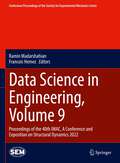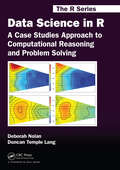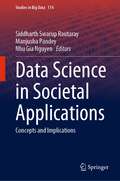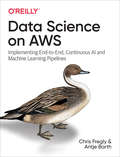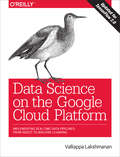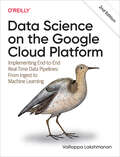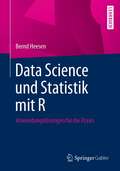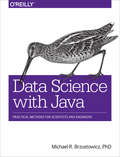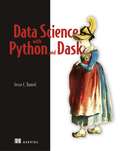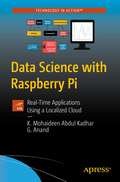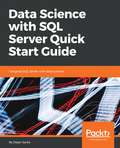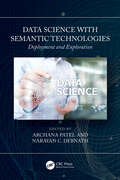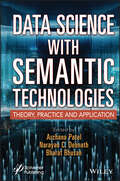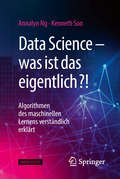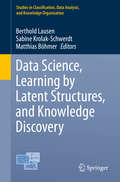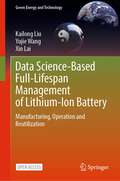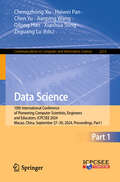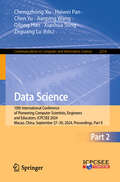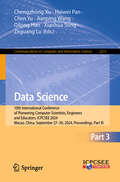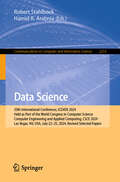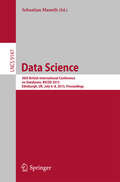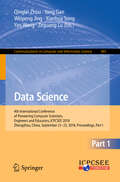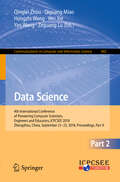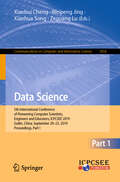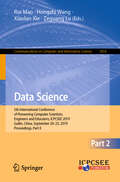- Table View
- List View
Data Science in Engineering, Volume 9: Proceedings of the 40th IMAC, A Conference and Exposition on Structural Dynamics 2022 (Conference Proceedings of the Society for Experimental Mechanics Series)
by Ramin Madarshahian Francois HemezData Science in Engineering, Volume 9: Proceedings of the 40th IMAC, A Conference and Exposition on Structural Dynamics, 2022, the nineth volume of nine from the Conference brings together contributions to this important area of research and engineering. The collection presents early findings and case studies on fundamental and applied aspects of Data Science in Engineering, including papers on:Novel Data-driven Analysis MethodsDeep Learning Gaussian Process AnalysisReal-time Video-based AnalysisApplications to Nonlinear Dynamics and Damage DetectionHigh-rate Structural Monitoring and Prognostics
Data Science in R: A Case Studies Approach to Computational Reasoning and Problem Solving (Chapman And Hall/crc The R Ser. #26)
by Deborah Nolan Duncan Temple LangEffectively Access, Transform, Manipulate, Visualize, and Reason about Data and ComputationData Science in R: A Case Studies Approach to Computational Reasoning and Problem Solving illustrates the details involved in solving real computational problems encountered in data analysis. It reveals the dynamic and iterative process by which data analysts
Data Science in Societal Applications: Concepts and Implications (Studies in Big Data #114)
by Nhu Gia Nguyen Siddharth Swarup Rautaray Manjusha PandeyThe book provides an insight into the practical applications and theoretical foundation of data science. The book discusses new ways of embracing agile approaches to various facets of data science, including machine learning and artificial intelligence, data mining, data visualization, and communication. The book includes contributions from academia and industry experts detailing the shortfalls of current tools and techniques used and generating the blueprint of the new technologies. The topics covered in the book range from theoretical and foundational research, platforms, methods, applications, and tools in data science. The chapters in the book add a social, geographical, and temporal dimension to data science research. The papers included are application-oriented that prepare and use data in discovery research. This book will provide researchers and practitioners with a detailed snapshot of current progress in data science. Moreover, it will stimulate new study, research, and the development of new applications.
Data Science on AWS: Implementing End-to-end, Continuous Ai And Machine Learning Pipelines
by Chris Fregly Antje BarthWith this practical book, AI and machine learning practitioners will learn how to successfully build and deploy data science projects on Amazon Web Services. The Amazon AI and machine learning stack unifies data science, data engineering, and application development to help level up your skills. This guide shows you how to build and run pipelines in the cloud, then integrate the results into applications in minutes instead of days. Throughout the book, authors Chris Fregly and Antje Barth demonstrate how to reduce cost and improve performance.Apply the Amazon AI and ML stack to real-world use cases for natural language processing, computer vision, fraud detection, conversational devices, and moreUse automated machine learning to implement a specific subset of use cases with SageMaker AutopilotDive deep into the complete model development lifecycle for a BERT-based NLP use case including data ingestion, analysis, model training, and deploymentTie everything together into a repeatable machine learning operations pipelineExplore real-time ML, anomaly detection, and streaming analytics on data streams with Amazon Kinesis and Managed Streaming for Apache KafkaLearn security best practices for data science projects and workflows including identity and access management, authentication, authorization, and more
Data Science on the Google Cloud Platform: Implementing End-to-End Real-Time Data Pipelines: From Ingest to Machine Learning
by Valliappa LakshmananLearn how easy it is to apply sophisticated statistical and machine learning methods to real-world problems when you build on top of the Google Cloud Platform (GCP). This hands-on guide shows developers entering the data science field how to implement an end-to-end data pipeline, using statistical and machine learning methods and tools on GCP. Through the course of the book, you’ll work through a sample business decision by employing a variety of data science approaches.Follow along by implementing these statistical and machine learning solutions in your own project on GCP, and discover how this platform provides a transformative and more collaborative way of doing data science.You’ll learn how to:Automate and schedule data ingest, using an App Engine applicationCreate and populate a dashboard in Google Data StudioBuild a real-time analysis pipeline to carry out streaming analyticsConduct interactive data exploration with Google BigQueryCreate a Bayesian model on a Cloud Dataproc clusterBuild a logistic regression machine-learning model with SparkCompute time-aggregate features with a Cloud Dataflow pipelineCreate a high-performing prediction model with TensorFlowUse your deployed model as a microservice you can access from both batch and real-time pipelines
Data Science on the Google Cloud Platform: Implementing End-to-End Real-Time Data Pipelines: From Ingest to Machine Learning
by Valliappa LakshmananLearn how easy it is to apply sophisticated statistical and machine learning methods to real-world problems when you build using Google Cloud Platform (GCP). This hands-on guide shows data engineers and data scientists how to implement an end-to-end data pipeline with cloud native tools on GCP.Throughout this updated second edition, you'll work through a sample business decision by employing a variety of data science approaches. Follow along by building a data pipeline in your own project on GCP, and discover how to solve data science problems in a transformative and more collaborative way.You'll learn how to:Employ best practices in building highly scalable data and ML pipelines on Google CloudAutomate and schedule data ingest using Cloud RunCreate and populate a dashboard in Data StudioBuild a real-time analytics pipeline using Pub/Sub, Dataflow, and BigQueryConduct interactive data exploration with BigQueryCreate a Bayesian model with Spark on Cloud DataprocForecast time series and do anomaly detection with BigQuery MLAggregate within time windows with DataflowTrain explainable machine learning models with Vertex AIOperationalize ML with Vertex AI Pipelines
Data Science und Statistik mit R: Anwendungslösungen für die Praxis
by Bernd HeesenData Science trägt wesentlich zu einer schnelleren Nutzbarmachung von Markt-, Kunden- und Nutzerdaten bei, inklusive der Analyse von Daten aus Sozialen Netzwerken. Wo früher klassische Statistik für Berechnungen und Vorhersagen herangezogen wurde, da erlauben heute Open-Source-Werkzeuge wie R Daten in unterschiedlichsten Formaten und aus beliebig vielen Quellen für die Analyse einzulesen, aufzubereiten und mit Hilfe von Methoden der Künstlichen Intelligenz und des Machine Learning zu analysieren. Die Ergebnisse können dann anschließend perfekt visuell dargestellt werden, so dass die Entscheider schnell und effektiv davon profitieren können. Daraus lässt sich ableiten, welche Maßnahmen mit einer vorhersagbaren Wahrscheinlichkeit zur Erreichung der eigenen Ziele geeignet sind, z.B. welcher Preis für ein Angebot die gewünschte Nachfrage erzeugt oder welche Marketingmaßnahme eine gewünschte Zielgruppe erreicht.Dieses Buch vermittelt auf Basis von R, wie Sie Statistik, Data Science, Künstliche Intelligenz und Machine Learning in der Industrie 4.0 nutzen können. Die Anwendungsbeispiele können von Lesern selbst durchgeführt werden, da das Buch die R-Anweisungen beinhaltet. Damit ist das Buch ideal für Studierende und andere Interessierte, die sich Kenntnisse in der Statistiklösung R aneignen wollen.
Data Science with Java: Practical Methods for Scientists and Engineers
by Michael R. BrzustowiczData Science is booming thanks to R and Python, but Java brings the robustness, convenience, and ability to scale critical to today’s data science applications. With this practical book, Java software engineers looking to add data science skills will take a logical journey through the data science pipeline. Author Michael Brzustowicz explains the basic math theory behind each step of the data science process, as well as how to apply these concepts with Java.You’ll learn the critical roles that data IO, linear algebra, statistics, data operations, learning and prediction, and Hadoop MapReduce play in the process. Throughout this book, you’ll find code examples you can use in your applications.Examine methods for obtaining, cleaning, and arranging data into its purest formUnderstand the matrix structure that your data should takeLearn basic concepts for testing the origin and validity of dataTransform your data into stable and usable numerical valuesUnderstand supervised and unsupervised learning algorithms, and methods for evaluating their successGet up and running with MapReduce, using customized components suitable for data science algorithms
Data Science with Python and Dask
by Jesse DanielSummaryDask is a native parallel analytics tool designed to integrate seamlessly with the libraries you're already using, including Pandas, NumPy, and Scikit-Learn. With Dask you can crunch and work with huge datasets, using the tools you already have. And Data Science with Python and Dask is your guide to using Dask for your data projects without changing the way you work!Purchase of the print book includes a free eBook in PDF, Kindle, and ePub formats from Manning Publications. You'll find registration instructions inside the print book.About the TechnologyAn efficient data pipeline means everything for the success of a data science project. Dask is a flexible library for parallel computing in Python that makes it easy to build intuitive workflows for ingesting and analyzing large, distributed datasets. Dask provides dynamic task scheduling and parallel collections that extend the functionality of NumPy, Pandas, and Scikit-learn, enabling users to scale their code from a single laptop to a cluster of hundreds of machines with ease.About the BookData Science with Python and Dask teaches you to build scalable projects that can handle massive datasets. After meeting the Dask framework, you'll analyze data in the NYC Parking Ticket database and use DataFrames to streamline your process. Then, you'll create machine learning models using Dask-ML, build interactive visualizations, and build clusters using AWS and Docker. What's insideWorking with large, structured and unstructured datasetsVisualization with Seaborn and DatashaderImplementing your own algorithmsBuilding distributed apps with Dask DistributedPackaging and deploying Dask appsAbout the ReaderFor data scientists and developers with experience using Python and the PyData stack.About the AuthorJesse Daniel is an experienced Python developer. He taught Python for Data Science at the University of Denver and leads a team of data scientists at a Denver-based media technology company.Table of ContentsPART 1 - The Building Blocks of scalable computingWhy scalable computing matters Introducing Dask PART 2 - Working with Structured Data using Dask DataFrames Introducing Dask DataFrames Loading data into DataFrames Cleaning and transforming DataFrames Summarizing and analyzing DataFrames Visualizing DataFrames with Seaborn Visualizing location data with Datashader PART 3 - Extending and deploying DaskWorking with Bags and Arrays Machine learning with Dask-ML Scaling and deploying Dask
Data Science with Raspberry Pi
by G. Anand K. Mohaideen Abdul KadharImplement real-time data processing applications on the Raspberry Pi. This book uniquely helps you work with data science concepts as part of real-time applications using the Raspberry Pi as a localized cloud. <P><P> You’ll start with a brief introduction to data science followed by a dedicated look at the fundamental concepts of Python programming. Here you’ll install the software needed for Python programming on the Pi, and then review the various data types and modules available. The next steps are to set up your Pis for gathering real-time data and incorporate the basic operations of data science related to real-time applications. You’ll then combine all these new skills to work with machine learning concepts that will enable your Raspberry Pi to learn from the data it gathers. Case studies round out the book to give you an idea of the range of domains where these concepts can be applied. <P><P> By the end of Data Science with the Raspberry Pi, you’ll understand that many applications are now dependent upon cloud computing. As Raspberry Pis are cheap, it is easy to use a number of them closer to the sensors gathering the data and restrict the analytics closer to the edge. You’ll find that not only is the Pi an easy entry point to data science, it also provides an elegant solution to cloud computing limitations through localized deployment.
Data Science with SQL Server Quick Start Guide: Integrate SQL Server with data science
by Dejan SarkaGet unique insights from your data by combining the power of SQL Server, R and PythonKey FeaturesUse the features of SQL Server 2017 to implement the data science project life cycleLeverage the power of R and Python to design and develop efficient data modelsfind unique insights from your data with powerful techniques for data preprocessing and analysisBook DescriptionSQL Server only started to fully support data science with its two most recent editions. If you are a professional from both worlds, SQL Server and data science, and interested in using SQL Server and Machine Learning (ML) Services for your projects, then this is the ideal book for you.This book is the ideal introduction to data science with Microsoft SQL Server and In-Database ML Services. It covers all stages of a data science project, from businessand data understanding,through data overview, data preparation, modeling and using algorithms, model evaluation, and deployment.You will learn to use the engines and languages that come with SQL Server, including ML Services with R and Python languages and Transact-SQL. You will also learn how to choose which algorithm to use for which task, and learn the working of each algorithm.What you will learnUse the popular programming languages,T-SQL, R, and Python, for data scienceUnderstand your data with queries and introductory statisticsCreate and enhance the datasets for MLVisualize and analyze data using basic and advanced graphsExplore ML using unsupervised and supervised modelsDeploy models in SQL Server and perform predictionsWho this book is forSQL Server professionals who want to start with data science, and data scientists who would like to start using SQL Server in their projects will find this book to be useful. Prior exposure to SQL Server will be helpful.
Data Science with Semantic Technologies: Deployment and Exploration
by Narayan C. Debnath Archana PatelGone are the days when data was interlinked with related data by humans and human interpretation was required. Data is no longer just data. It is now considered a Thing or Entity or Concept with meaning, so that a machine not only understands the concept but also extrapolates the way humans do.Data Science with Semantic Technologies: Deployment and Exploration, the second volume of a two-volume handbook set, provides a roadmap for the deployment of semantic technologies in the field of data science and enables the user to create intelligence through these technologies by exploring the opportunities and eradicating the challenges in the current and future time frame. In addition, this book offers the answer to various questions like: What makes a technology semantic as opposed to other approaches to data science? What is knowledge data science? How does knowledge data science relate to other fields? This book explores the optimal use of these technologies to provide the highest benefit to the user under one comprehensive source and title. As there is no dedicated book available in the market on this topic at this time, this book becomes a unique resource for scholars, researchers, data scientists, professionals, and practitioners. This volume can serve as an important guide toward applications of data science with semantic technologies for the upcoming generation.
Data Science with Semantic Technologies: Theory, Practice and Application (Advances in Intelligent and Scientific Computing)
by Narayan C. Debnath Bharat Bhusan Archana PatelDATA SCIENCE WITH SEMANTIC TECHNOLOGIES This book will serve as an important guide toward applications of data science with semantic technologies for the upcoming generation and thus becomes a unique resource for scholars, researchers, professionals, and practitioners in this field. To create intelligence in data science, it becomes necessary to utilize semantic technologies which allow machine-readable representation of data. This intelligence uniquely identifies and connects data with common business terms, and it also enables users to communicate with data. Instead of structuring the data, semantic technologies help users to understand the meaning of the data by using the concepts of semantics, ontology, OWL, linked data, and knowledge-graphs. These technologies help organizations to understand all the stored data, adding the value in it, and enabling insights that were not available before. As data is the most important asset for any organization, it is essential to apply semantic technologies in data science to fulfill the need of any organization. Data Science with Semantic Technologies provides a roadmap for the deployment of semantic technologies in the field of data science. Moreover, it highlights how data science enables the user to create intelligence through these technologies by exploring the opportunities and eradicating the challenges in the current and future time frame. In addition, this book provides answers to various questions like: Can semantic technologies be able to facilitate data science? Which type of data science problems can be tackled by semantic technologies? How can data scientists benefit from these technologies? What is knowledge data science? How does knowledge data science relate to other domains? What is the role of semantic technologies in data science? What is the current progress and future of data science with semantic technologies? Which types of problems require the immediate attention of researchers? Audience Researchers in the fields of data science, semantic technologies, artificial intelligence, big data, and other related domains, as well as industry professionals, software engineers/scientists, and project managers who are developing the software for data science. Students across the globe will get the basic and advanced knowledge on the current state and potential future of data science.
Data Science – was ist das eigentlich?!: Algorithmen des maschinellen Lernens verständlich erklärt
by Annalyn Ng Kenneth SooSie möchten endlich wissen, was sich hinter Schlagworten wie „Data Science“ und „Machine Learning“ eigentlich verbirgt – und was man alles damit anstellen kann? Auf allzu viel Mathematik würden Sie dabei aber gern verzichten? Dann sind Sie hier genau richtig: Dieses Buch bietet einen kompakten Einblick in die wichtigsten Schlüsselkonzepte der Datenwissenschaft und ihrer Algorithmen – und zwar ohne Sie mit mathematischen Formeln und Details zu belasten! Der Fokus liegt – nach einer übergeordneten Einführung – auf Anwendungen des maschinellen Lernens zur Mustererkennung und Vorhersage von Ergebnissen: In jedem Kapitel wird ein Algorithmus erläutert und mit einem leicht verständlichen, realen Anwendungsbeispiel verknüpft. Die Kombination aus intuitiven Erklärungen und zahlreichen Abbildungen ermöglicht dabei ein grundlegendes Verständnis, das ohne mathematische Formelsprache auskommt. Abschließend werden auch die Grenzen und Nachteile der betrachteten Algorithmen explizit aufgezeigt.
Data Science, Learning by Latent Structures, and Knowledge Discovery (Studies in Classification, Data Analysis, and Knowledge Organization)
by Berthold Lausen Sabine Krolak-Schwerdt Matthias BöhmerThis volume comprises papers dedicated to data science and the extraction of knowledge from many types of data: structural, quantitative, or statistical approaches for the analysis of data; advances in classification, clustering and pattern recognition methods; strategies for modeling complex data and mining large data sets; applications of advanced methods in specific domains of practice. The contributions offer interesting applications to various disciplines such as psychology, biology, medical and health sciences; economics, marketing, banking and finance; engineering; geography and geology; archeology, sociology, educational sciences, linguistics and musicology; library science. The book contains the selected and peer-reviewed papers presented during the European Conference on Data Analysis (ECDA 2013) which was jointly held by the German Classification Society (GfKl) and the French-speaking Classification Society (SFC) in July 2013 at the University of Luxembourg.
Data Science-Based Full-Lifespan Management of Lithium-Ion Battery: Manufacturing, Operation and Reutilization (Green Energy and Technology)
by Xin Lai Kailong Liu Yujie WangThis open access book comprehensively consolidates studies in the rapidly emerging field of battery management. The primary focus is to overview the new and emerging data science technologies for full-lifespan management of Li-ion batteries, which are categorized into three groups, namely (i) battery manufacturing management, (ii) battery operation management, and (iii) battery reutilization management. The key challenges, future trends as well as promising data-science technologies to further improve this research field are discussed. As battery full-lifespan (manufacturing, operation, and reutilization) management is a hot research topic in both energy and AI fields and none specific book has focused on systematically describing this particular from a data science perspective before, this book can attract the attention of academics, scientists, engineers, and practitioners. It is useful as a reference book for students and graduates working in related fields. Specifically, the audience could not only get the basics of battery manufacturing, operation, and reutilization but also the information of related data-science technologies. The step-by-step guidance, comprehensive introduction, and case studies to the topic make it accessible to audiences of different levels, from graduates to experienced engineers.
Data Science: 10th International Conference of Pioneering Computer Scientists, Engineers and Educators, ICPCSEE 2024, Macao, China, September 27–30, 2024, Proceedings, Part I (Communications in Computer and Information Science #2213)
by Qilong Han Xianhua Song Zeguang Lu Chen Yu Jianping Wang Chengzhong Xu Haiwei PanThis three-volume set CCIS 2213-2215 constitutes the refereed proceedings of the 10th International Conference of Pioneering Computer Scientists, Engineers and Educators, ICPCSEE 2024, held in Macau, China, during September 27–30, 2024. The 74 full papers and 3 short papers presented in these three volumes were carefully reviewed and selected from 249 submissions. The papers are organized in the following topical sections: Part I: Novel methods or tools used in big data and its applications; applications of data science. Part II: Education research, methods and materials for data science and engine; data security and privacy; big data mining and knowledge management. Part III: Infrastructure for data science; social media and recommendation system; multimedia data management and analysis.
Data Science: 10th International Conference of Pioneering Computer Scientists, Engineers and Educators, ICPCSEE 2024, Macao, China, September 27–30, 2024, Proceedings, Part II (Communications in Computer and Information Science #2214)
by Qilong Han Xianhua Song Zeguang Lu Chen Yu Jianping Wang Chengzhong Xu Haiwei PanThis three-volume set CCIS 2213-2215 constitutes the refereed proceedings of the 10th International Conference of Pioneering Computer Scientists, Engineers and Educators, ICPCSEE 2024, held in Macau, China, during September 27–30, 2024. The 74 full papers and 3 short papers presented in these three volumes were carefully reviewed and selected from 249 submissions. The papers are organized in the following topical sections: Part I: Novel methods or tools used in big data and its applications; applications of data science. Part II: Education research, methods and materials for data science and engine; data security and privacy; big data mining and knowledge management. Part III: Infrastructure for data science; social media and recommendation system; multimedia data management and analysis.
Data Science: 10th International Conference of Pioneering Computer Scientists, Engineers and Educators, ICPCSEE 2024, Macao, China, September 27–30, 2024, Proceedings, Part III (Communications in Computer and Information Science #2215)
by Qilong Han Xianhua Song Zeguang Lu Chen Yu Jianping Wang Chengzhong Xu Haiwei PanThis three-volume set CCIS 2213-2215 constitutes the refereed proceedings of the 10th International Conference of Pioneering Computer Scientists, Engineers and Educators, ICPCSEE 2024, held in Macau, China, during September 27–30, 2024. The 74 full papers and 3 short papers presented in these three volumes were carefully reviewed and selected from 249 submissions. The papers are organized in the following topical sections: Part I: Novel methods or tools used in big data and its applications; applications of data science. Part II: Education research, methods and materials for data science and engine; data security and privacy; big data mining and knowledge management. Part III: Infrastructure for data science; social media and recommendation system; multimedia data management and analysis.
Data Science: 20th International Conference, ICDATA 2024, Held as Part of the World Congress in Computer Science, Computer Engineering and Applied Computing, CSCE 2024, Las Vegas, NV, USA, July 22–25, 2024, Revised Selected Papers (Communications in Computer and Information Science #2253)
by Hamid R. Arabnia Robert StahlbockThis book constitutes the proceedings of the 20th International Conference on Data Science, ICDATA 2024, held as part of the 2024 World Congress in Computer Science, Computer Engineering and Applied Computing, in Las Vegas, USA, during July 22 to July 25, 2024. This proceedings book includes 39 papers selected from a total of 243 submissions. They are organized in topical sections as follows: Artificial intelligence, data science, and neural networks; natural language processing, large language modelc, generative AI; data science, data analytics, and applications; prediction and forecasting and security applications; and poster papers.
Data Science: 30th British International Conference on Databases, BICOD 2015, Edinburgh, UK, July 6-8, 2015, Proceedings (Lecture Notes in Computer Science #9147)
by Sebastian ManethThis book constitutes the refereed conference proceedings of the 30th British International Conference on Databases, BICOD 2015 - formerly known as BNCOD (British National Conference on Databases) - held in Edinburgh, UK, in July 2015. The 19 revised full papers, presented together with three invited keynotes and three invited lectures were carefully reviewed and selected from 37 submissions. Special focus of the conference has been "Data Science" and so the papers cover a wide range of topics related to databases and data-centric computation.
Data Science: 4th International Conference of Pioneering Computer Scientists, Engineers and Educators, ICPCSEE 2018, Zhengzhou, China, September 21-23, 2018, Proceedings, Part I (Communications in Computer and Information Science #901)
by Yan Wang Weipeng Jing Xianhua Song Zeguang Lu Yong Gan Qinglei ZhouThis two volume set (CCIS 901 and 902) constitutes the refereed proceedings of the 4th International Conference of Pioneering Computer Scientists, Engineers and Educators, ICPCSEE 2018 (originally ICYCSEE) held in Zhengzhou, China, in September 2018. The 125 revised full papers presented in these two volumes were carefully reviewed and selected from 1057 submissions. The papers cover a wide range of topics related to basic theory and techniques for data science including mathematical issues in data science, computational theory for data science, big data management and applications, data quality and data preparation, evaluation and measurement in data science, data visualization, big data mining and knowledge management, infrastructure for data science, machine learning for data science, data security and privacy, applications of data science, case study of data science, multimedia data management and analysis, data-driven scientific research, data-driven bioinformatics, data-driven healthcare, data-driven management, data-driven eGovernment, data-driven smart city/planet, data marketing and economics, social media and recommendation systems, data-driven security, data-driven business model innovation, social and/or organizational impacts of data science.
Data Science: 4th International Conference of Pioneering Computer Scientists, Engineers and Educators, ICPCSEE 2018, Zhengzhou, China, September 21-23, 2018, Proceedings, Part II (Communications in Computer and Information Science #902)
by Yan Wang Hongzhi Wang Zeguang Lu Wei Xie Qinglei Zhou Qiguang MiaoThis two volume set (CCIS 901 and 902) constitutes the refereed proceedings of the 4th International Conference of Pioneering Computer Scientists, Engineers and Educators, ICPCSEE 2018 (originally ICYCSEE) held in Zhengzhou, China, in September 2018. The 125 revised full papers presented in these two volumes were carefully reviewed and selected from 1057 submissions. The papers cover a wide range of topics related to basic theory and techniques for data science including mathematical issues in data science, computational theory for data science, big data management and applications, data quality and data preparation, evaluation and measurement in data science, data visualization, big data mining and knowledge management, infrastructure for data science, machine learning for data science, data security and privacy, applications of data science, case study of data science, multimedia data management and analysis, data-driven scientific research, data-driven bioinformatics, data-driven healthcare, data-driven management, data-driven eGovernment, data-driven smart city/planet, data marketing and economics, social media and recommendation systems, data-driven security, data-driven business model innovation, social and/or organizational impacts of data science.
Data Science: 5th International Conference of Pioneering Computer Scientists, Engineers and Educators, ICPCSEE 2019, Guilin, China, September 20–23, 2019, Proceedings, Part I (Communications in Computer and Information Science #1058)
by Weipeng Jing Xianhua Song Zeguang Lu Xiaohui ChengThis two volume set (CCIS 1058 and 1059) constitutes the refereed proceedings of the 5th International Conference of Pioneering Computer Scientists, Engineers and Educators, ICPCSEE 2019 held in Guilin, China, in September 2019. The 104 revised full papers presented in these two volumes were carefully reviewed and selected from 395 submissions. The papers cover a wide range of topics related to basic theory and techniques for data science including data mining; data base; net work; security; machine learning; bioinformatics; natural language processing; software engineering; graphic images; system; education; application.
Data Science: 5th International Conference of Pioneering Computer Scientists, Engineers and Educators, ICPCSEE 2019, Guilin, China, September 20–23, 2019, Proceedings, Part II (Communications in Computer and Information Science #1059)
by Hongzhi Wang Zeguang Lu Xiaolan Xie Rui MaoThis two volume set (CCIS 1058 and 1059) constitutes the refereed proceedings of the 5th International Conference of Pioneering Computer Scientists, Engineers and Educators, ICPCSEE 2019 held in Guilin, China, in September 2019. The 104 revised full papers presented in these two volumes were carefully reviewed and selected from 395 submissions. The papers cover a wide range of topics related to basic theory and techniques for data science including data mining; data base; net work; security; machine learning; bioinformatics; natural language processing; software engineering; graphic images; system; education; application.
